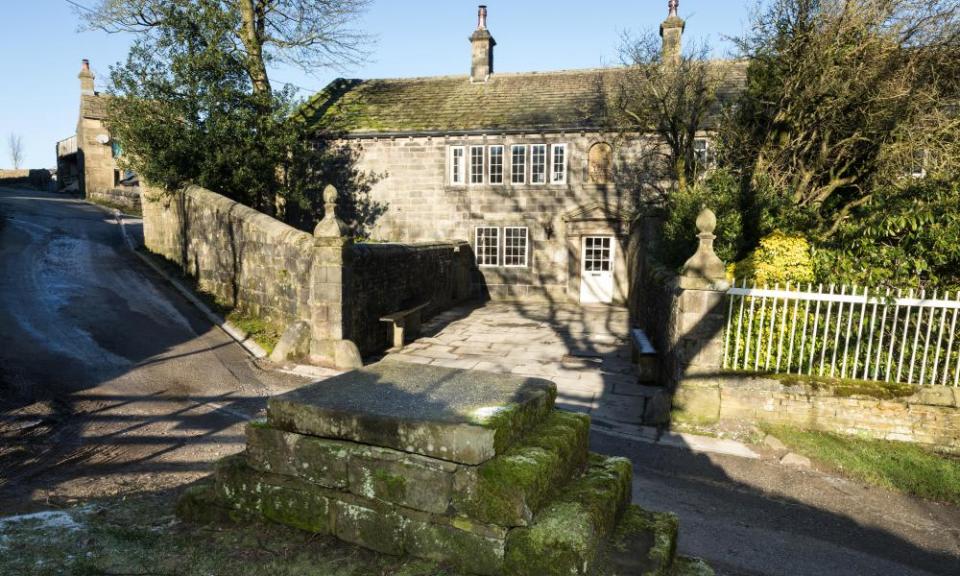'Let me in – let me in!' Wuthering Heights house for sale at £1m

A scratching on a window pane, the fingers of a small ice-cold hand, a melancholy voice begging to be let in. The appearance of Cathy’s ghost at the start of Emily Brontë’s Wuthering Heights is familiar to millions of readers and devotees of the 19th-century literary sisters. Now the house that is believed to have inspired the scene at the window is up for sale, although enthusiasts will need to find £1m for this piece of Brontë heritage.
The owners of Ponden Hall – a Grade II* listed property in Stanbury, near Haworth in West Yorkshire, and a thriving B&B – are retiring and downsizing more than 20 years after taking on the then-dilapidated house and carefully restoring it. The hall was owned by the Heaton family, who were trustees of Haworth parish church where Patrick Brontë, the sisters’ father, became vicar in 1820.
Ponden Hall is an incredibly atmospheric house, and if it wasn’t the model for Wuthering Heights, it should have been
Ann Dinsdale, Brontë Society
“He would have been in fairly regular contact with the Heatons, and the children would have grown up knowing the house,” said Ann Dinsdale of the Brontë Society. “Ponden Hall had a really fine library, and we know the Brontës were avid readers. It’s difficult to imagine they would have let the opportunity to borrow books slip by.”
During a cataclysmic mudslide caused by days of rain culminating in a heavy storm in 1824, three of Brontë children – Anne, Emily and their brother Branwell – and a servant sought shelter at Ponden Hall. Elements of the house interior are thought to have found their way into descriptions in Wuthering Heights, Emily’s only novel, and The Tenant of Wildfell Hall by her younger sister, Anne.
“It’s difficult to know how well they would have known the interior of the house, but in the popular imagination it stands for both Wuthering Heights and Wildfell Hall. There are quite obvious parallels between the Heaton family and the Earnshaws of Wuthering Heights. [Ponden Hall] is an incredibly atmospheric house, and if it wasn’t the model for Wuthering Heights, it should have been,” said Dinsdale.

One room features a small window in the gable wall which fits the description in Wuthering Heights of Cathy’s ghost scratching at the glass. Mr Lockwood, the story’s narrator, who is snowed in for the night at Wuthering Heights, believes the sound is caused by nearby trees.
He stretches out “to seize the importunate branch; instead of which, my fingers closed on the fingers of a little, ice-cold hand. The intense horror of nightmare came over me: I tried to draw back my arm, but the hand clung to it, and a most melancholy voice sobbed, ‘Let me in – let me in!’”
Mr Lockwood also describes an oak closet containing a bed in the room. Julie Akhurst, Ponden Hall’s current owner, discovered ancient documents relating to the house, which describe a box-bed in a room across from the library. She and her husband, Steve Brown, had a replica made and installed.
“I started to research the history of the house, and gradually found out more and more,” Akhurst said. “It’s clear that Wuthering Heights wasn’t based solely on Ponden Hall – the location is wrong – but was a composite of different houses.”
The couple opened Ponden Hall, which dates from 1634, as a B&B six years ago. “We get a lot of Brontë enthusiasts from all over the world staying. Some are complete fanatics. Probably the best informed guest was a woman from Vietnam.”
The house has been used by the Brontë Society for meetings and workshops because the Brontë family parsonage, home to the Brontë museum, is comparatively small.
“This has been a wonderful family home for us, and then a business, but it’s time to move on,” said Akhurst. The couple are hoping to relocate to Sweden. “We feel we need a complete break. It would be hard to leave Ponden but live nearby, as it means so much to us.”


